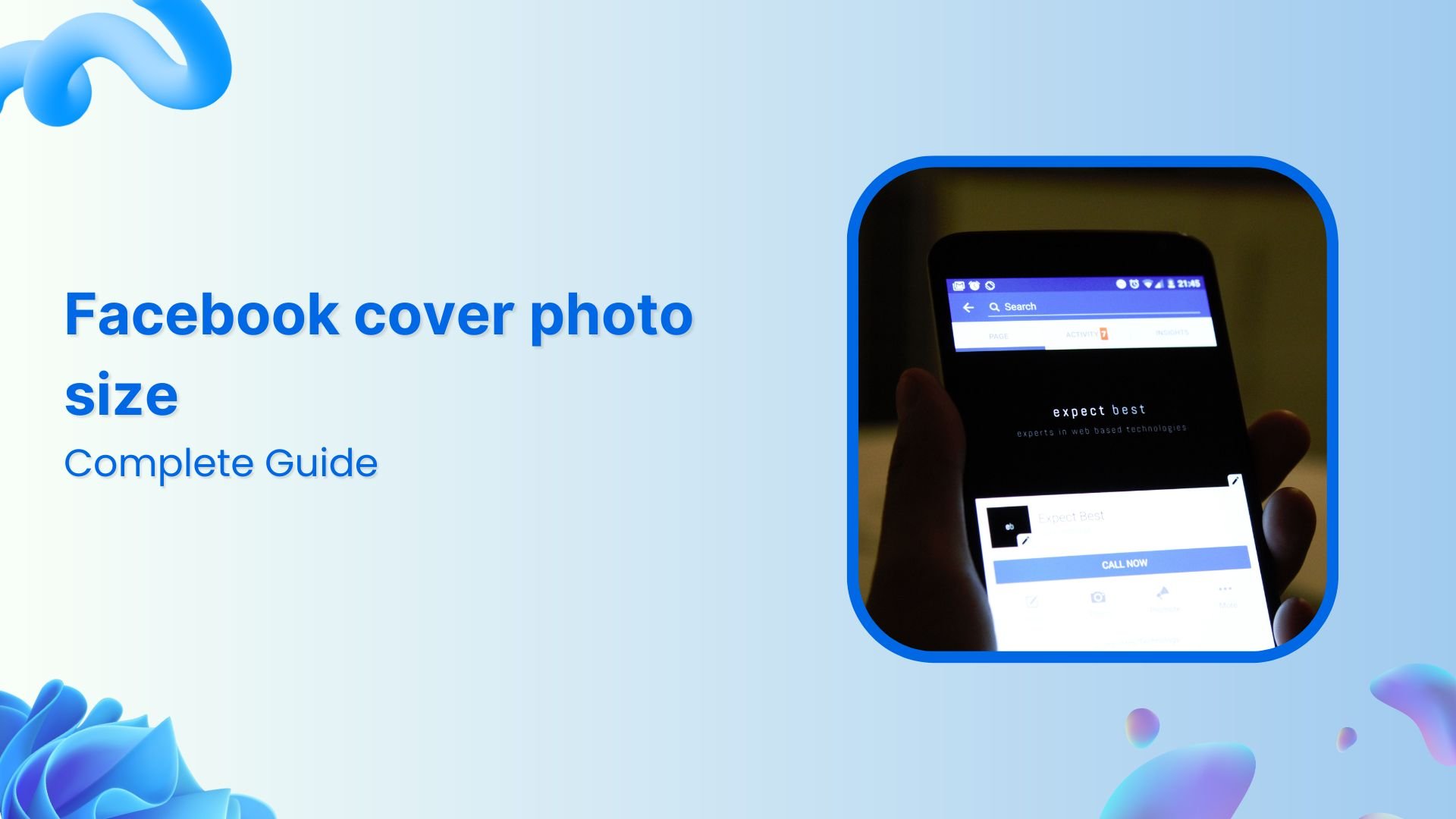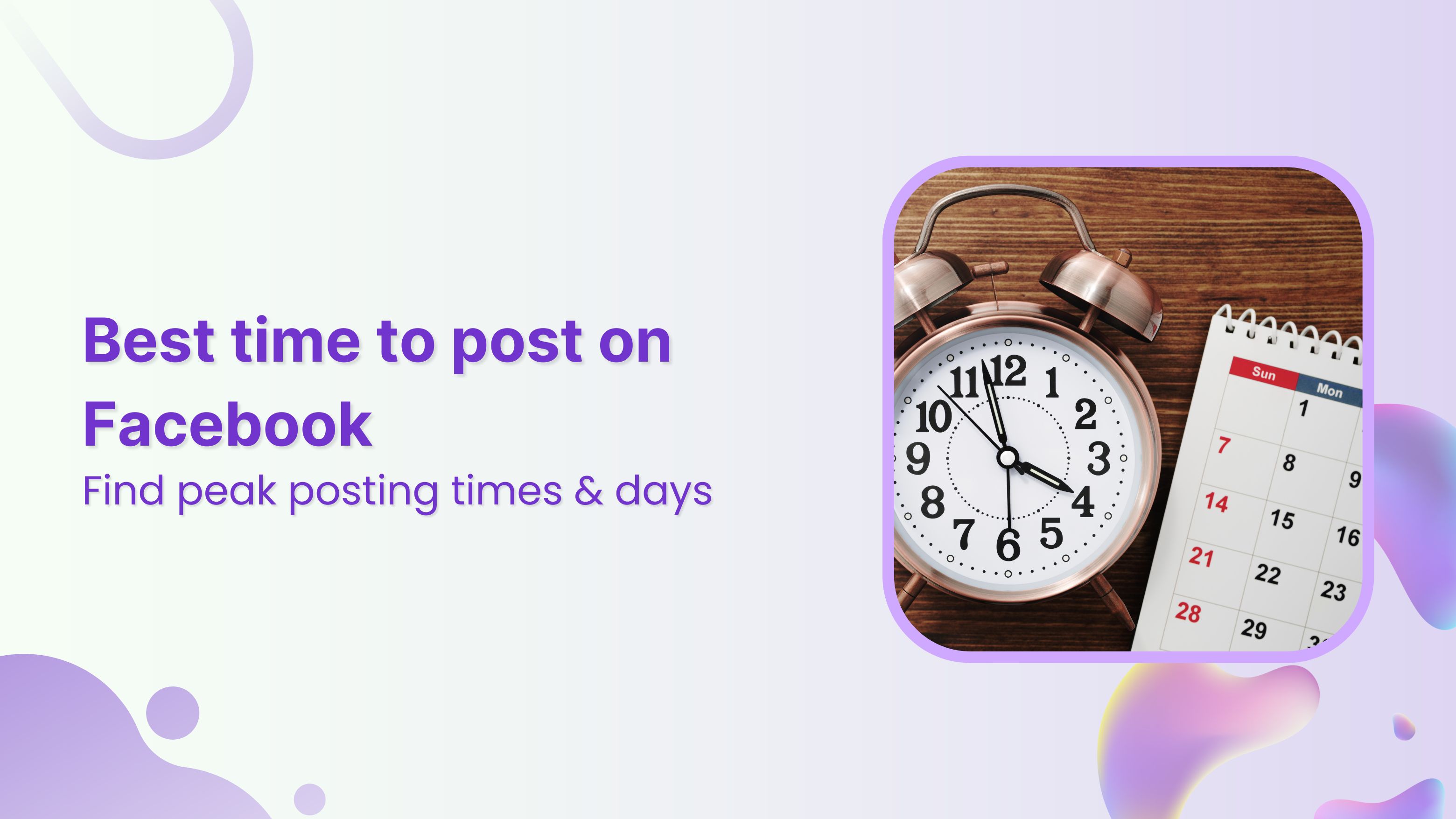Bulk-generate & schedule posts in seconds with Smart Scheduling. Try now!
Ultimate guide to schedule Facebook posts, Reels & Stories
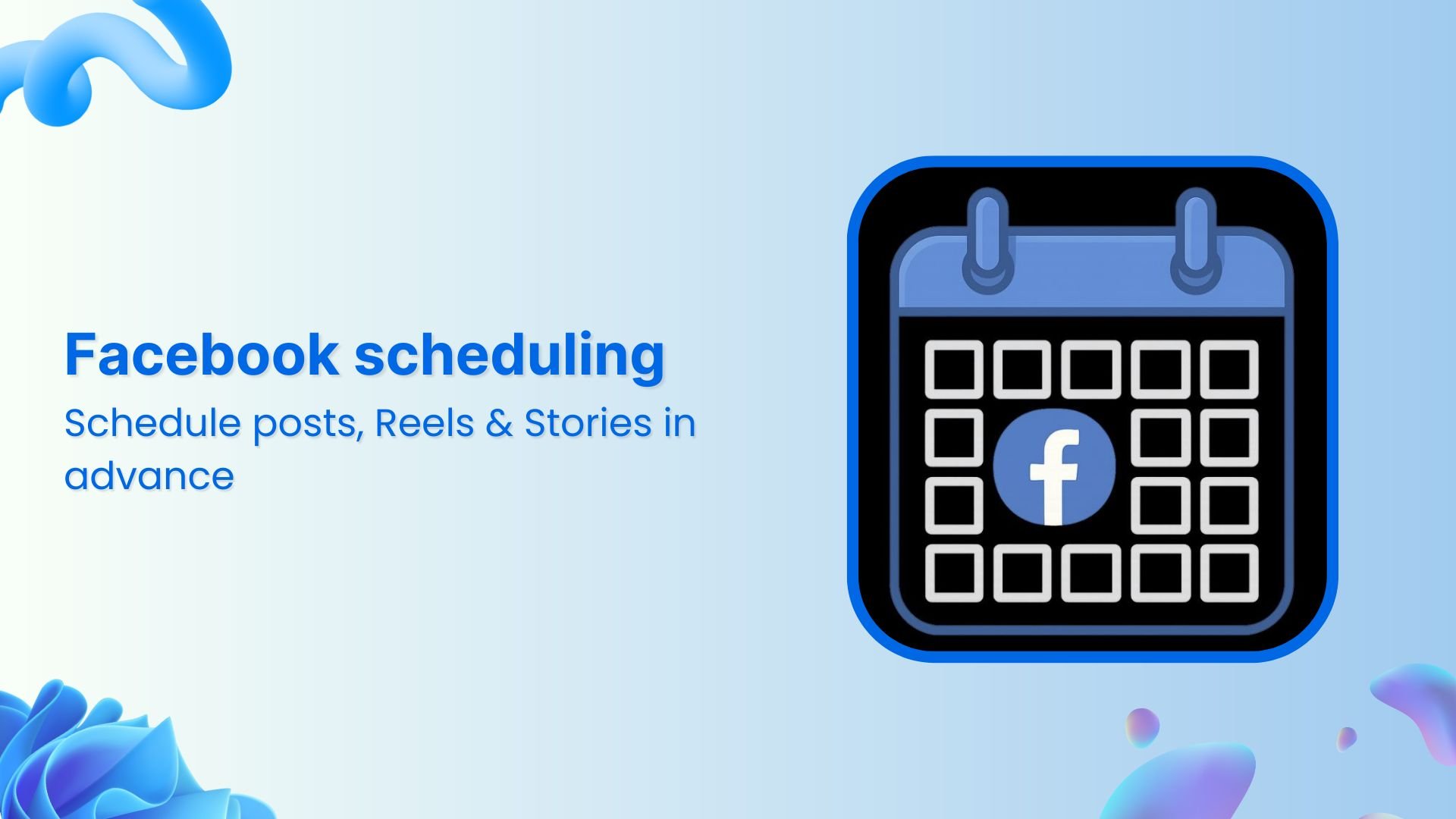
Have you ever noticed that you have not been very active on Facebook? Sometimes, you spend way too much time scrolling through the Instagram feed and procrastinate on stuff that matters.
It’s normal to get sucked into this social media content valve. The constant flow of the latest news, friends’ updates, work opportunities, and fun videos makes it difficult for individuals and brands to create and post something valuable.
I neglect to post on Facebook because I don’t have something funny or helpful to share with the Facebook audience, not to mention the nerve-wracking daily logins to post content.
Social media scheduling, including Facebook scheduling, has been around for a while. Since it’s a stepping stone for posting consistently, social media experts and pro-bloggers schedule their Facebook posts.
Scheduling Facebook posts allows them to show up regularly, which results in establishing authority, building influence, and growing community on the Facebook platform.
If you have been ignoring Facebook publishing for a while, then it’s time to revamp your social media strategy a little. Therefore, the first step might be opting for social media management tool or software to take things to the next level.
Investing in a social media scheduling tool without breaking the bank won’t be a bad idea.
Let’s dig deeper into this idea and explore different angles of Facebook scheduling.
Shall we?
Facebook Marketing
Manage and grow your brand on Facebook. Create, schedule, and publish posts, videos, and Reels to Facebook pages and groups.
Get Started for FREE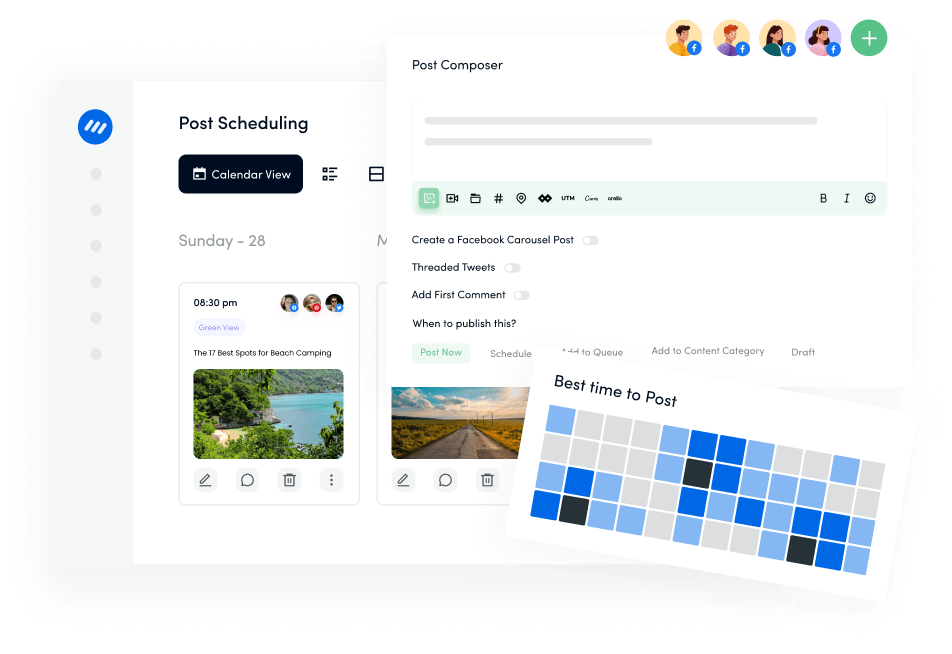
Why you should schedule Facebook posts, Reels, and Stories in 2025
Manual posting on social media is easier said than done. If you’ve ever tried publishing content manually every day, you already know how time consuming and inconsistent it can get.
That’s exactly why millions of creators, marketers, and businesses use scheduling tools to stay active on Facebook without being glued to their phones.
So if you’re still on the fence about scheduling your Facebook posts, Reels, and Stories, here are solid reasons to start today:
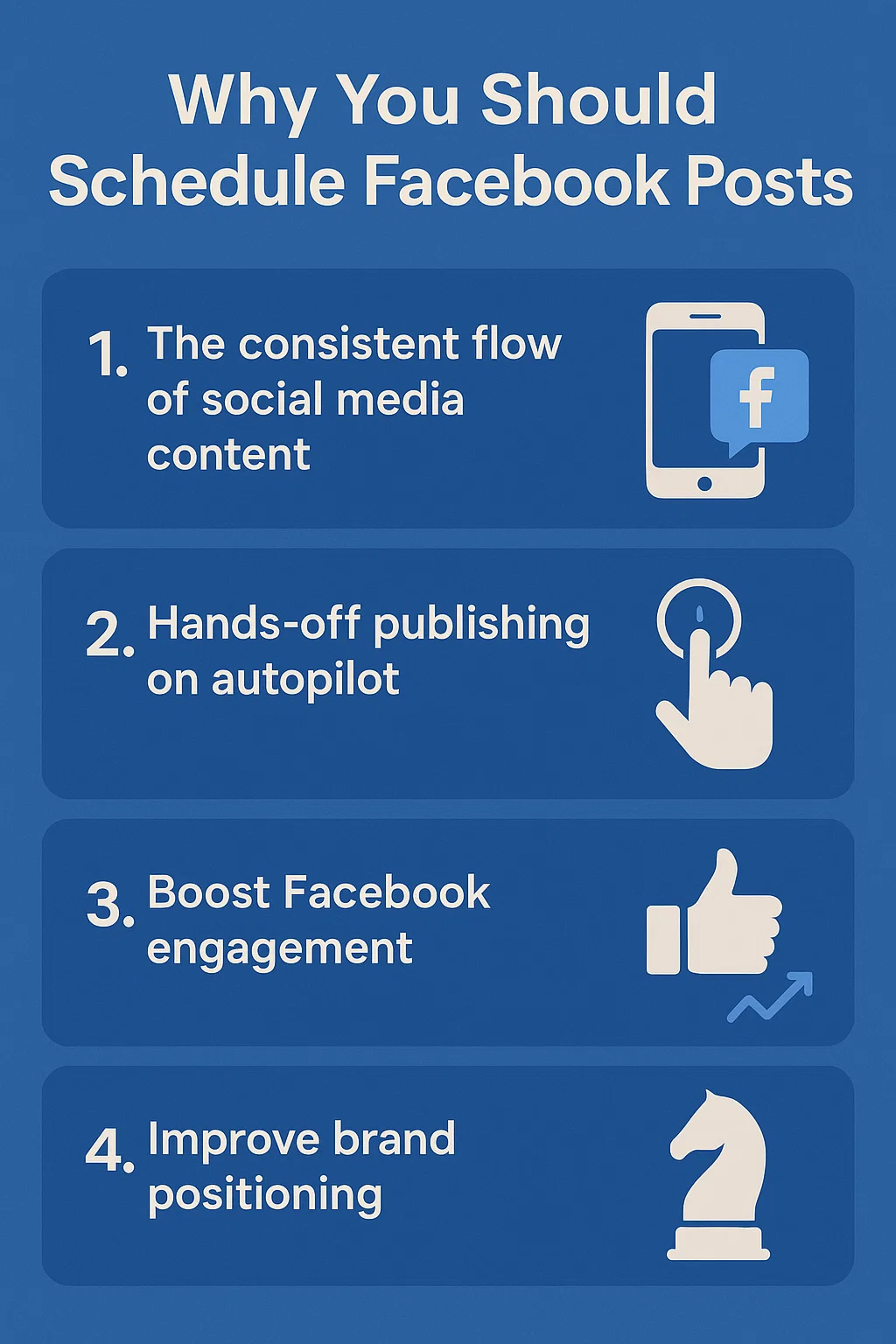
1. Consistent flow of content (without burnout)
Scheduling ensures you maintain a steady presence without logging in every day. With a scheduler like ContentStudio, you can plan and publish a whole week’s content in under 30 minutes, then enjoy a stress-free weekend.
Consistency is what fuels reach, engagement, and growth on Facebook.
2. Hands-off publishing on autopilot
Busy managing your business or creating content? You don’t have to show up daily to stay active. With scheduling, you create once, schedule once and let it run.
Whether it’s a Facebook post, a trending Reel, or a quick Story update, your content goes live automatically at the best time.
3. Boost your Facebook engagement
When your content goes out consistently especially Stories and Reels, you increase the chance of reaching your audience when they’re active.
More exposure = more likes, shares, and replies.
In fact, scheduling helps you be seen more without doing more.
4. Improve brand positioning
The more consistently you show up, the more familiar and trustworthy your brand becomes. Whether you’re sharing valuable content, behind-the-scenes videos, or special offers, scheduling helps you stay top-of-mind in your niche.
5. Facebook Reels & Stories deserve a strategy
Reels and Stories are now essential for visibility on Facebook. And yes, you can (and should) schedule them too!
Use Facebook Reels to:
- Announce your latest blog or YouTube video
- Promote limited-time discounts
- Share product updates or launches
- Ask engaging questions or start trends
- Repurpose content from TikTok or Instagram
Use Stories to:
- Share behind-the-scenes clips
- Tease upcoming releases
- Share polls, countdowns, or Q&As
- Keep your followers in the loop daily
These short-form formats keep you relevant, increase engagement, and give your brand a more human touch.
How to schedule Facebook posts, Reels and Stories
Most social media influencers use scheduling tools to schedule their Facebook posts, tweets, LinkedIn posts, and Pinterest pins. However, it’s not rocket science to schedule your social media content.
Read-Up: Publishing & scheduling to Instagram using ContentStudio Mobile App
For anyone who wants to schedule their Facebook posts, this 5-step guide would crack open everything for them. Let’s find out how to schedule Facebook posts keeping in view the Facebook algorithm:
1. Build a content plan for Facebook
It’s easier to start looking for a social media scheduler immediately, but that’s not the way. Instead, start with building a social media content plan for Facebook.
It does seem a little dull when you don’t get to the creamy part quickly, but laying the foundation pays off later.
A content plan for Facebook is a fancy term for figuring out what you want to post on the platform and who you want to reach out to through your Facebook content.
Here are a few things that matter in building content for any social media platform:
- The target audience to attract by content
- The message to deliver in the content
- The types of content to create
- The design approach of the imagery
- The call-to-actions for the social content
So keep all these things in mind when sitting down to establish a social media content strategy for your brand.
Social Media Content Calendar
Stay consistent and organized with Contentstudio’s social media content calendar for marketers and agencies.
Get Started for FREE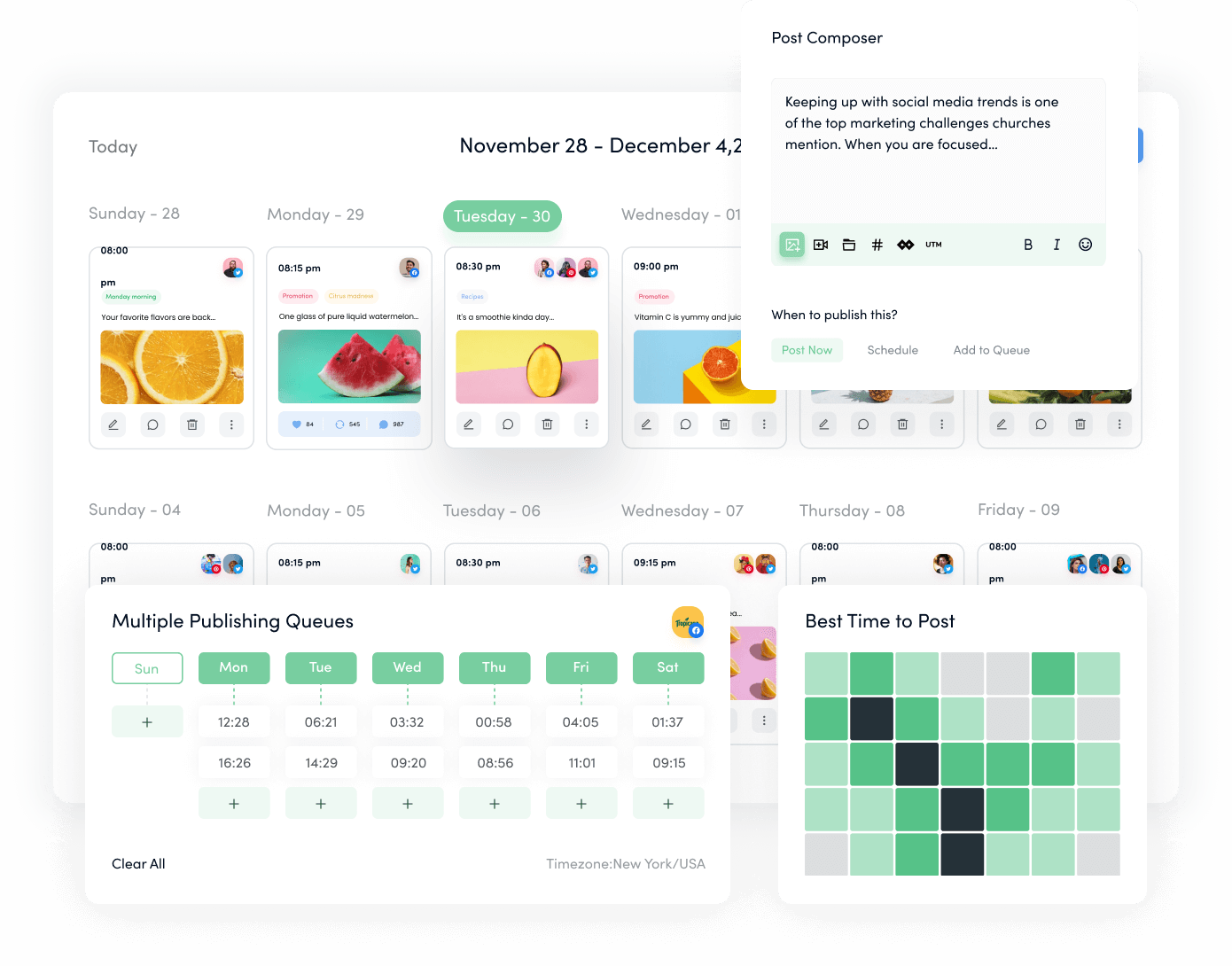
2. Sign up for a social media scheduler
A social media scheduler is a SAAS platform that lets users publish and schedule their social media posts across different social media networks.
To start with Facebook scheduling, you must opt for a social media scheduling tool that lets you schedule Facebook posts.
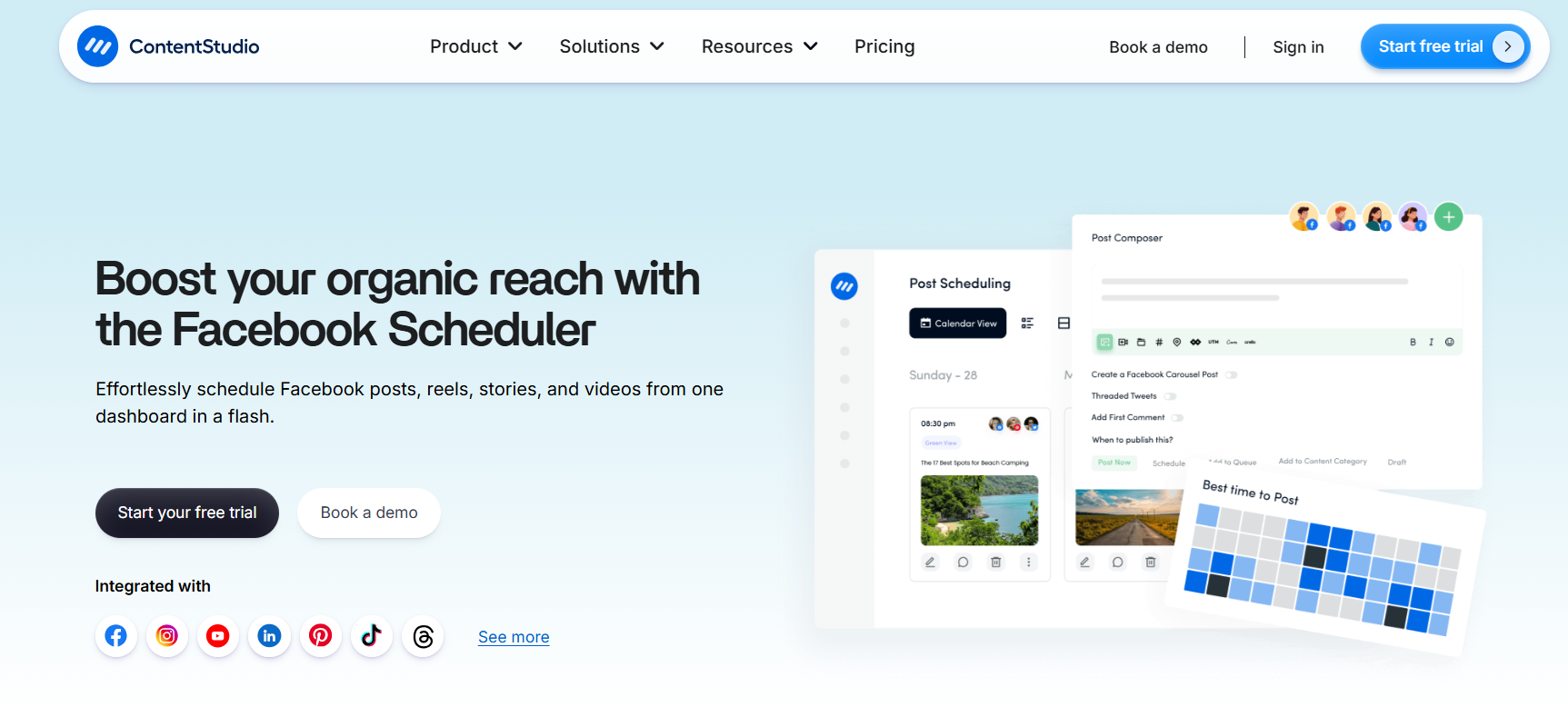
ContentStudio is my go-to social media scheduler for scheduling and posting social media content across all social media platforms. It’s a powerful social media management tool for influencers, businesses, and agencies.
This social media management tool has several features, such as social media scheduling, analytics, curation, workspaces, and workflows. It’s a complete social media management system to run a social media marketing campaign effectively.
3. Connect a Facebook property
Once the user has opted for a social media scheduling tool, the very next step is to connect a Facebook page or group to the scheduler.
Connecting your Facebook property to ContentStudio is the mandatory step in scheduling Facebook posts via ContentStudio. However, you don’t have to configure it every time you go for it.
So here’s the step-by-step process of connecting a Facebook property (such as a page or group) to the ContentStudio platform.
I. Sign up for a ContentStudio account
Facebook scheduling begins with signing up for a social media scheduler. I have been using ContentStudio for over three years now, and it’s been a fantastic social media manager for me.
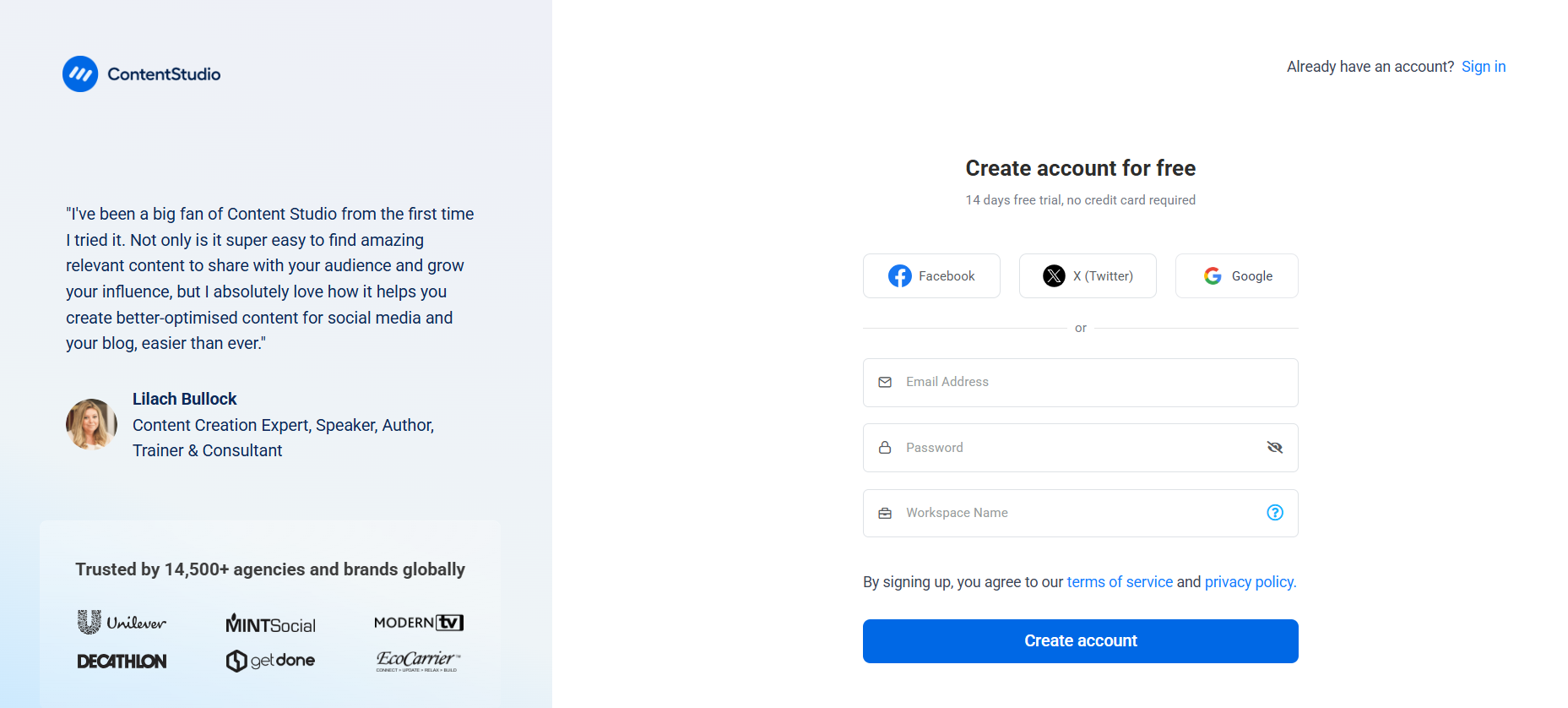
I highly recommend using this tool if you’re getting into Facebook. Go to the ContentStudio website and click the sign-up button to get started. If you’ve already created an account, skip the first step and move on.
II. Log into the account
Go to the ContentStudio website and click on the sign-in call-to-action button at the top menu bar. Use your account credentials to log in to your ContentStudio account.
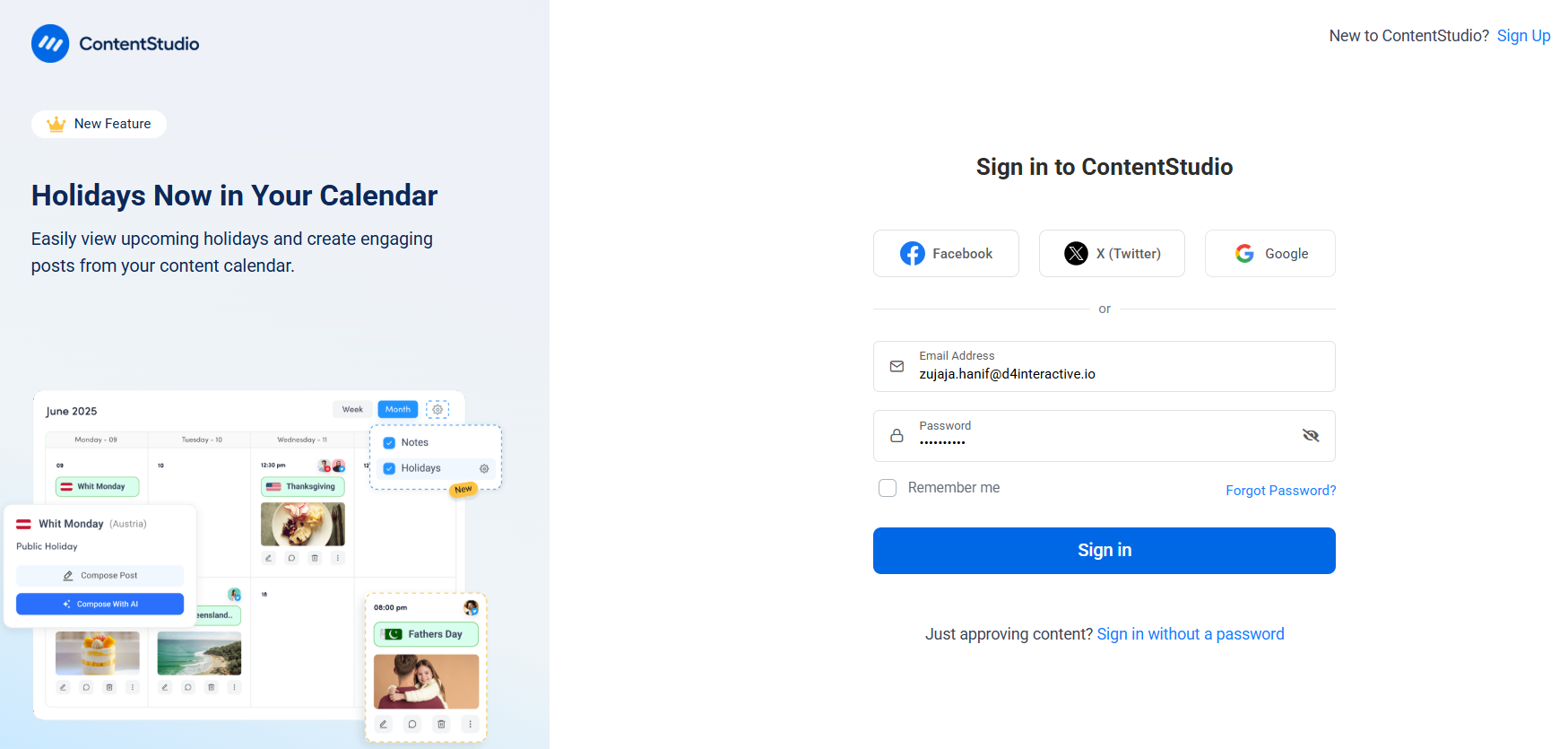
You’d see a dashboard full of options; don’t panic if it’s your first time. Instead, follow the instructions mentioned in this article to get things going. The next step is crucial to scheduling Facebook posts through this social media scheduler.
III. Connect your Facebook page or group
To connect your Facebook page or group to your ContentStudio account, click on your profile button at the top left of the dashboard.
A drop-down menu would appear. Look out for the “Social Profiles” option on the drop-down menu.
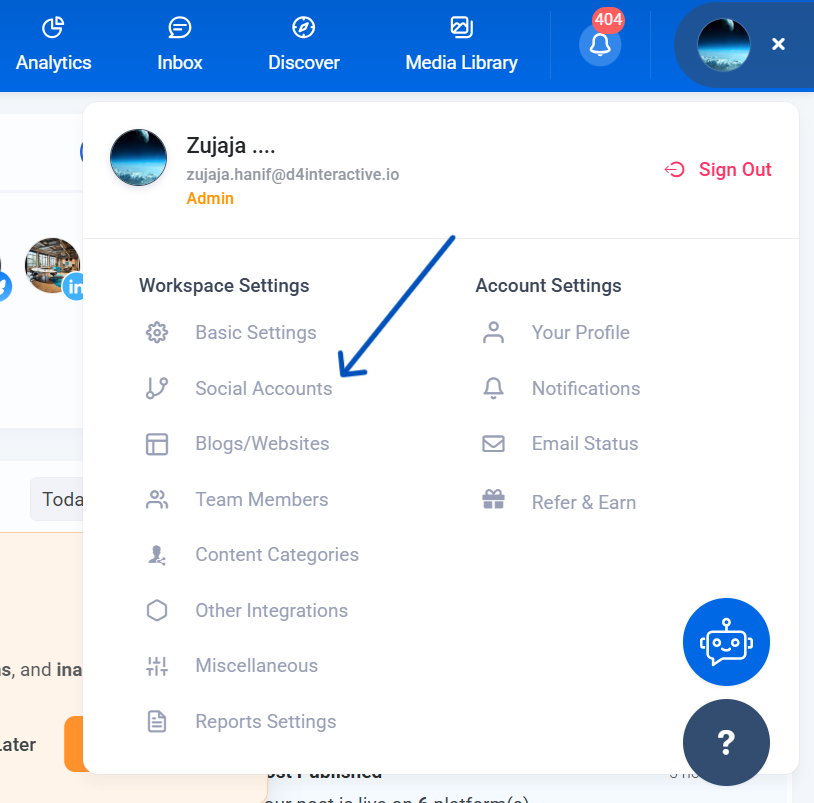
You may want to click on the social profiles button and initiate the social media platforms integration.
IV. Authenticate the integration
Click the “connect your Facebook page or group” button in front of the Facebook sign. It’ll start the authentication process, meaning you’ll be asked to confirm the integration between ContentStudio and your Facebook account.

You can choose the account type as well:
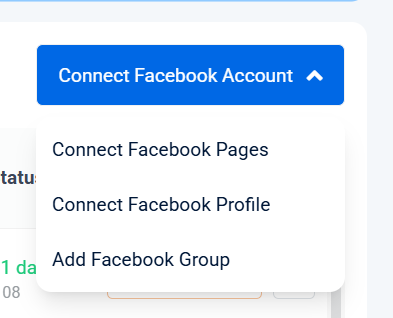
If it’s your first time connecting your ContentStudio account with Facebook, you might have to confirm your username and password to authenticate the login process.
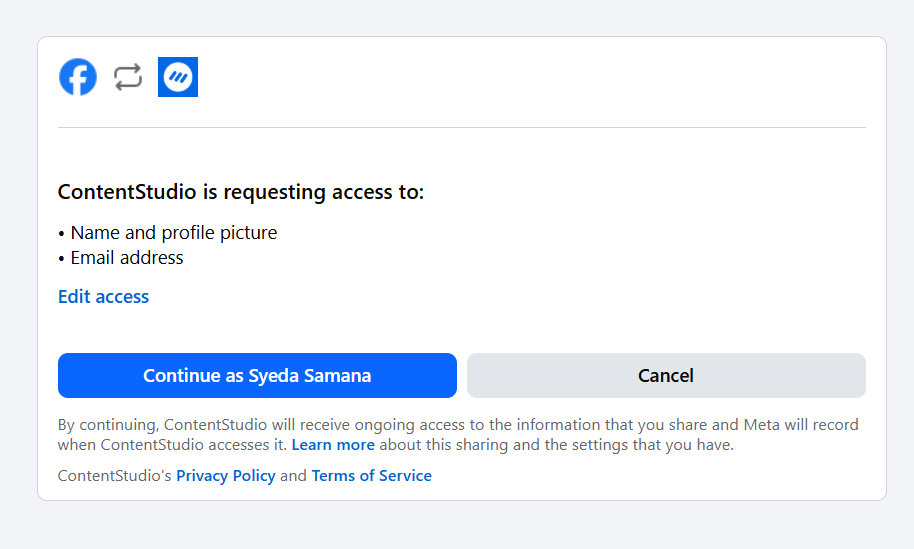
Once done, you’ll see the Facebook page or group connection status as valid in your ContentStudio account.
4. Craft your social media content
It’s the stage when social media managers or marketers sit down to create their social media posts to schedule for the future.
Creating social media content to schedule on Facebook does seem like a simple job, but it’s not what most people think.
One of the fundamentals of scheduling social media content on any platform is that you must have social media content beforehand.
The two basics of crafting social media content for Facebook scheduling are copy and imagery. Here’s some explanation:
- Copy: It’s the text part that elaborates on the purpose of the social media post or delivers the message of the creator
- Imagery: It’s the supporting images, infographics, and screenshots that help the author explain or justify the point of view.
Here’s the list of tools you’d know to craft social media content:
- Canva: To create social media images for a blog post or social media platforms
- Grammarly: To fix the grammar and spelling errors in the copy
- Filmora: To edit videos for social media platforms
- Nimbus: To record screen or take screenshots
- bg: To remove pictures’ backgrounds for graphics designing
- ContentStudio: To schedule social media posts on Facebook or other platforms
Keep your target audience in mind when creating social media content for any platform. The content strategy is usually designed at the content planning stage, but the application is seen at this point.
5. Prepare your posts for scheduling
My tool of choice is ContentStudio – it’s been an excellent social media scheduler for me for years. So allow me to share how to schedule your Facebook posts using ContentStudio.
Log in to your ContentStudio account and choose the appropriate Workspace from the top left corner of the dashboard.

Go to the Publisher section from the top menu and choose Compose.
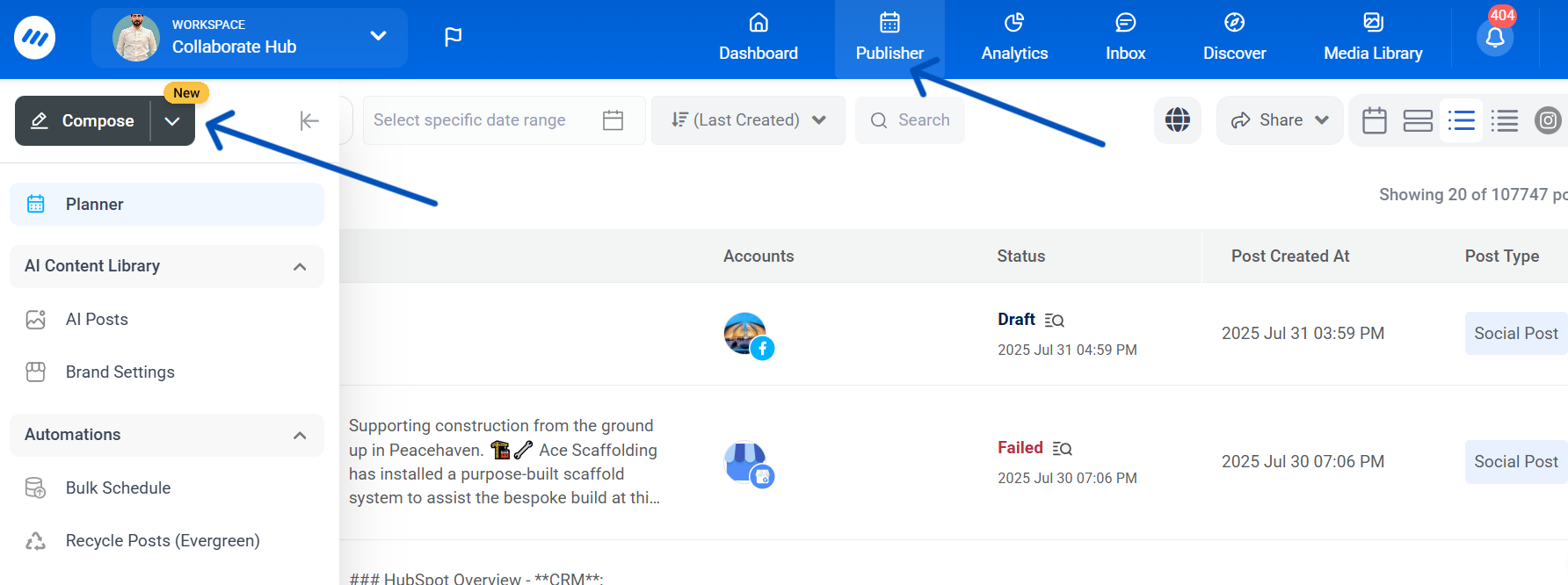
Choose post type from the dropdown.
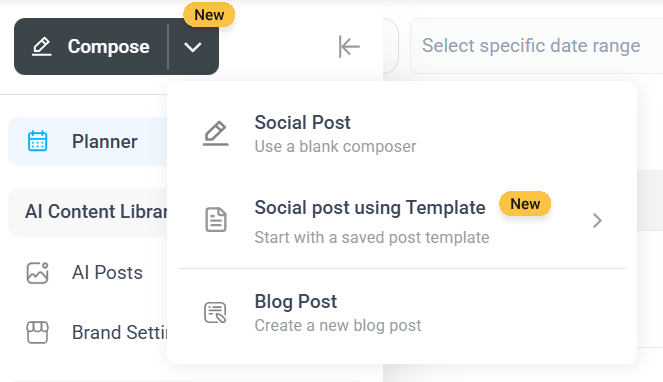
Choose the specific social media platform from the left section and move to the Post Composer on the right.
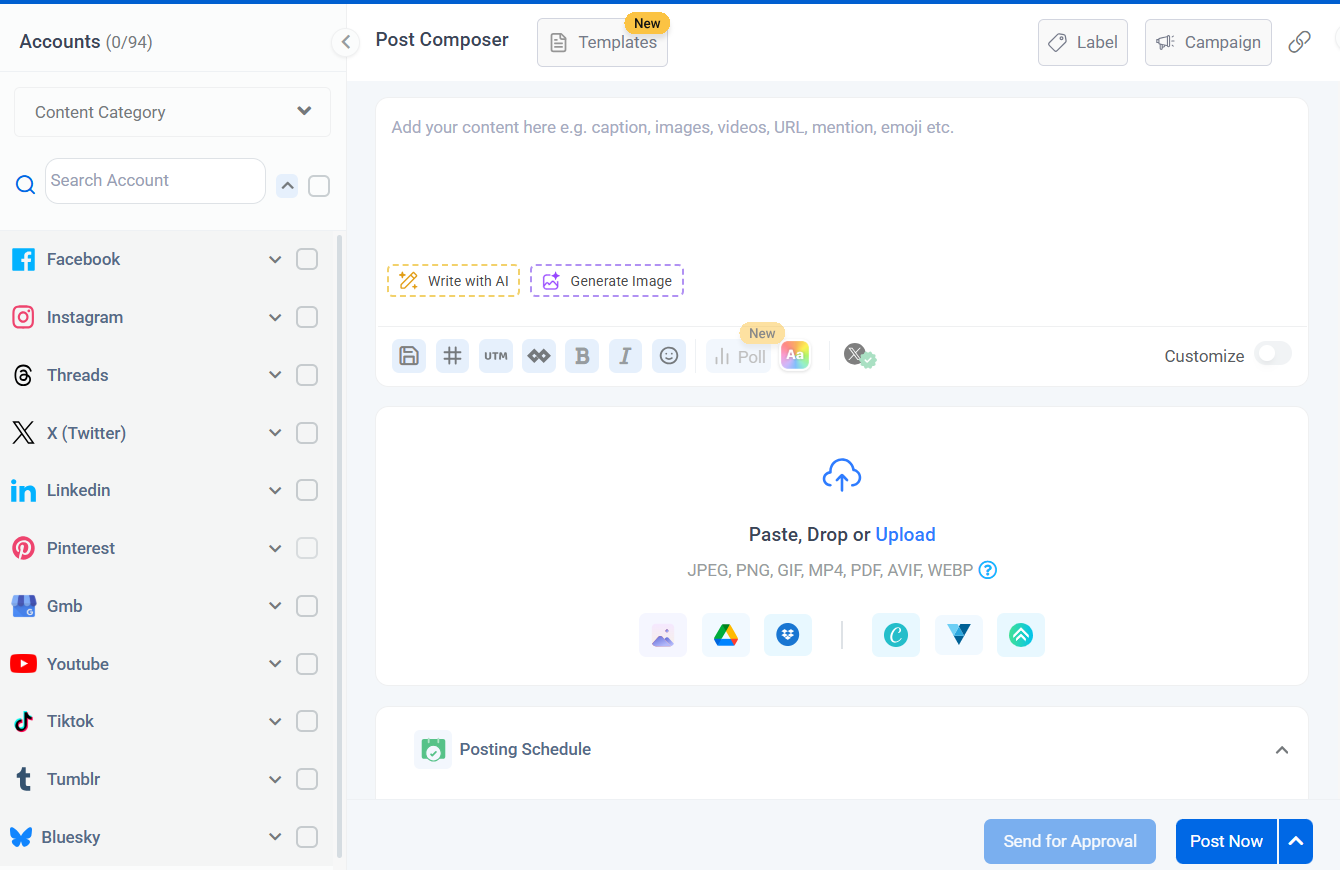
Write down the copy, add your image, and select the schedule from the post schedule section. You can also generate image via AI using ContentStudio.
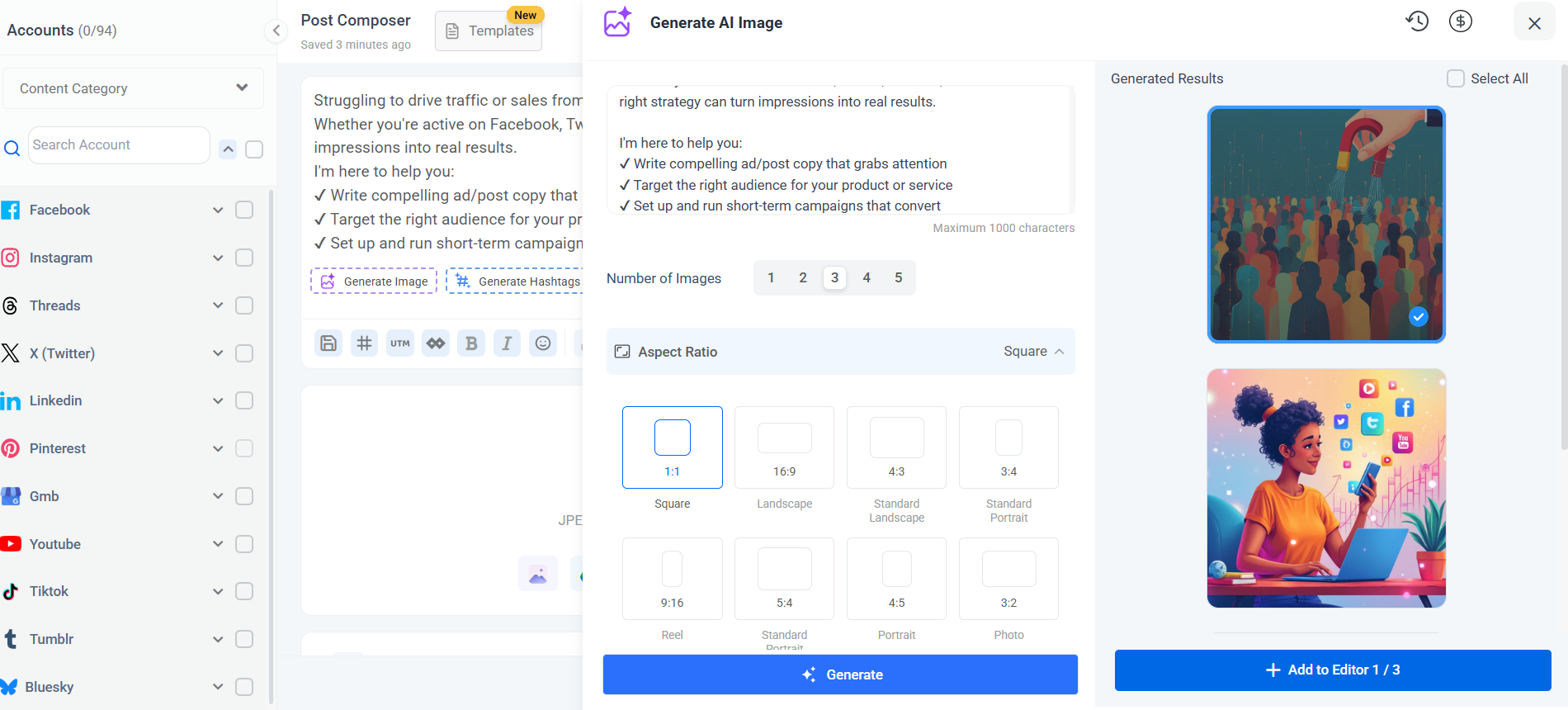
Double-check everything and click Schedule. You could also click on the Send for Approval button if you’re not yet authorized to directly publish or schedule social media content.
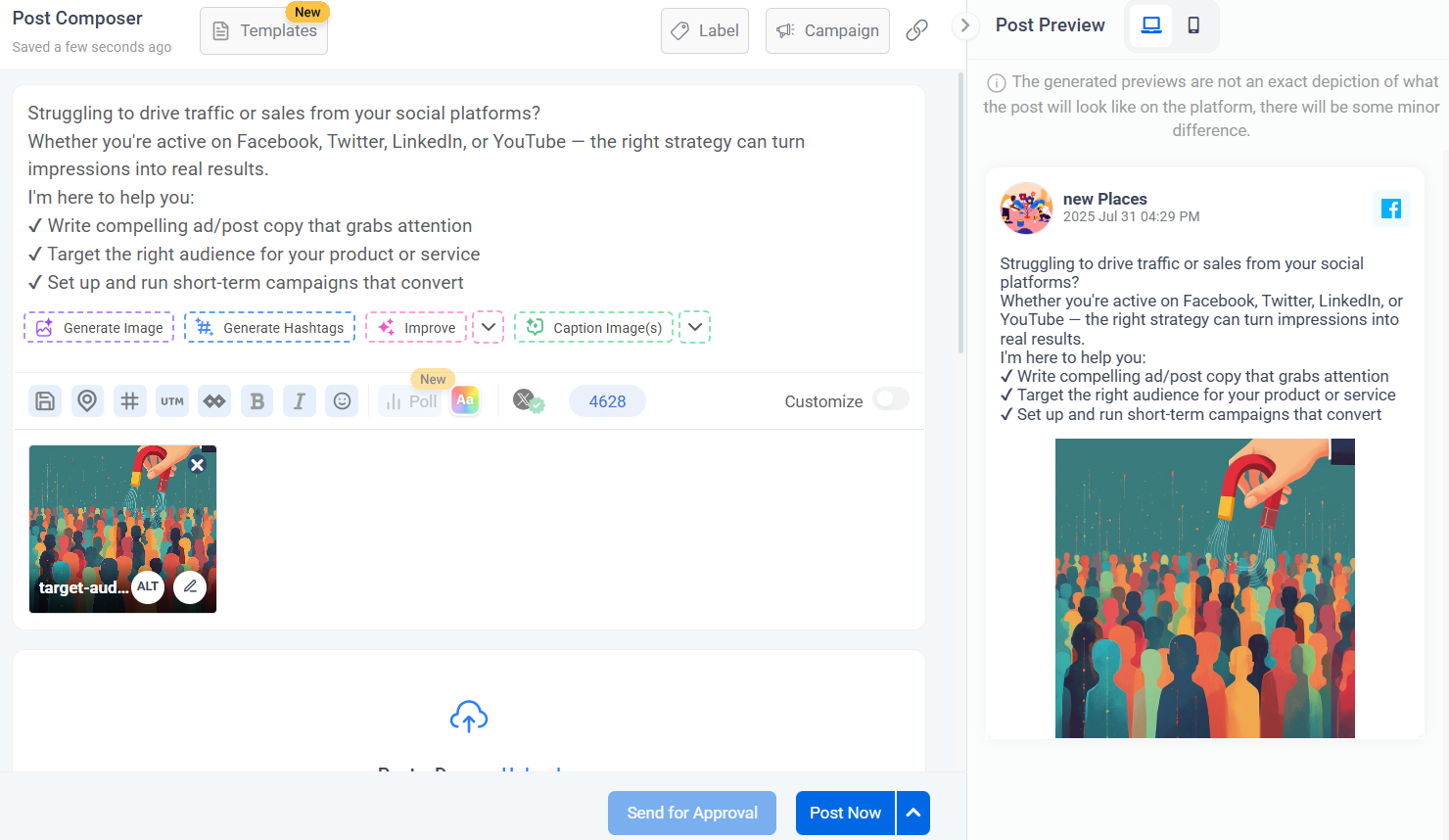
Dont forget to choose the post type before scheduling:
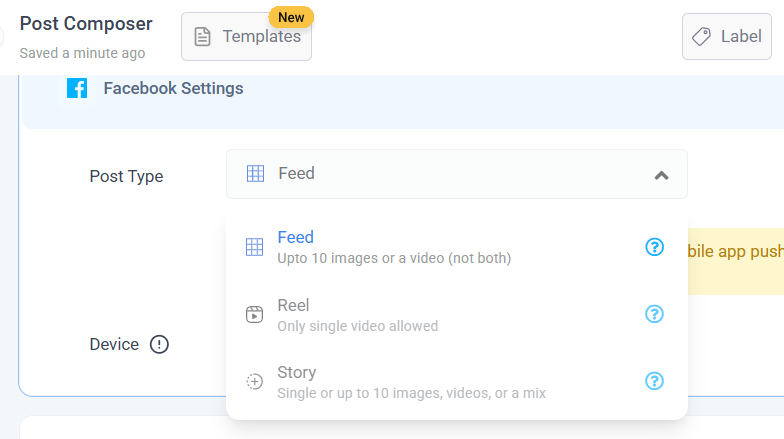
You can also choose the device on which you wants to get a push notification.

Finally, choose from multiple posting options and there you go, your post is now scheduled or published.
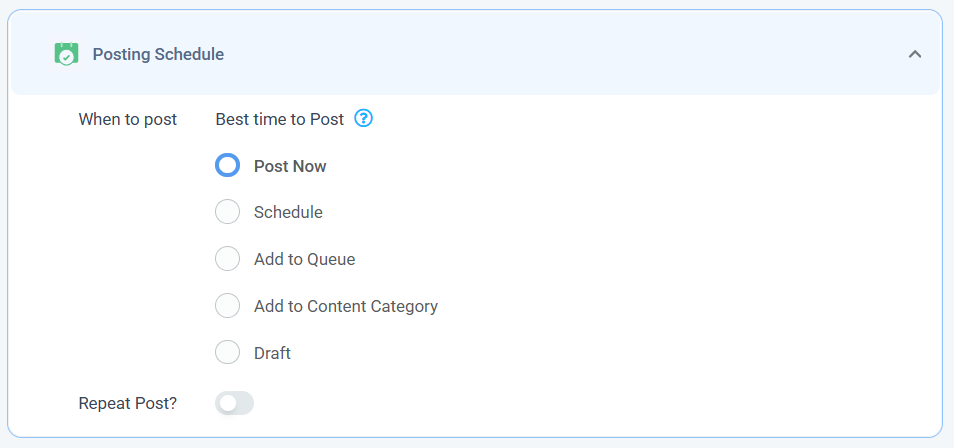
Related read: Ways to schedule social content using ContentStudio
6. Track your analytics to see the performance
Scheduling or publishing social media content blindly has never been a great strategy. So don’t turn a blind eye to the analytics.
Social media analytics give you an inside-out report on what has been happening with your social media content.
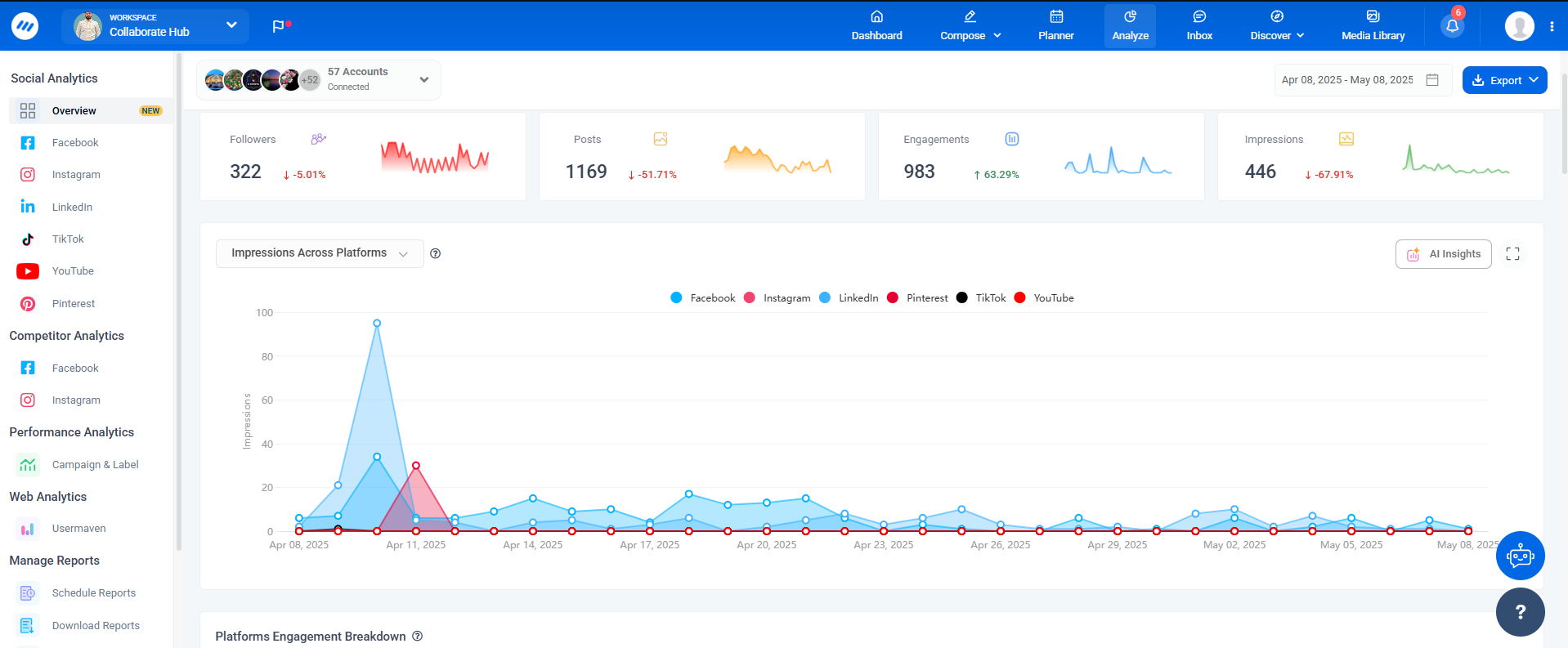
ContentStudio has an analytics section that allows users to dive deep into their social media content performance. Find out about the top-performing posts on Facebook, LinkedIn, Twitter, Instagram, and Pinterest.
Furthermore, it lets you schedule or download performance reports to stay updated with your social media content performance.
Social Media Analytics
Fine-tune your social media strategy for success with in-depth analytics and white-labeled reports.
Get Started for FREE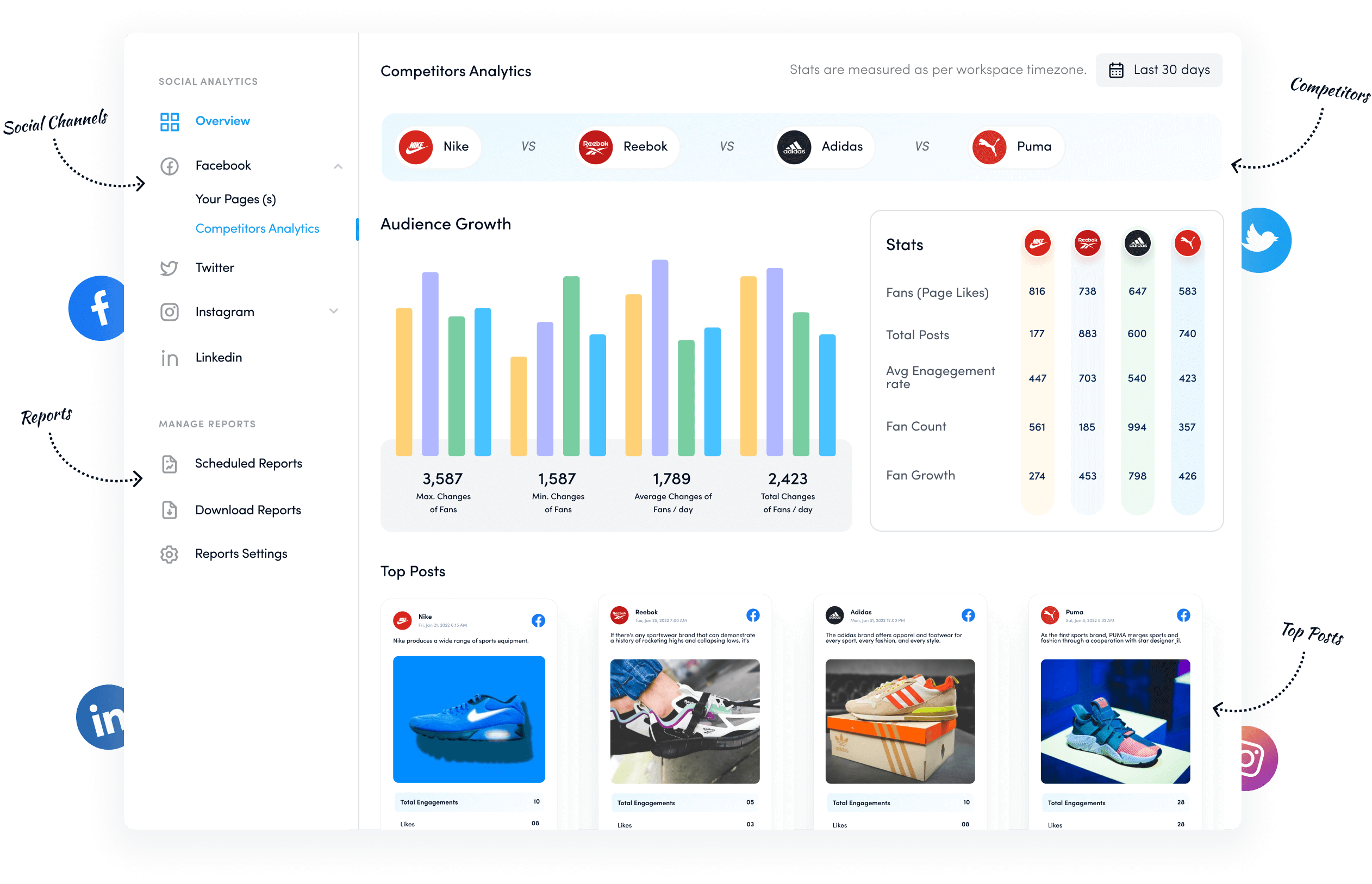
Tips for scheduling Facebook posts, Reels, and Stories
Are you gearing up for scheduling Facebook content? Here are six tips that are worth knowing:
1. Use a good social media scheduler
Using an affordable yet good-quality social media scheduler like ContentStudio does help the Facebook scheduling process. It’s the easiest and fastest way to schedule Facebook posts.
However, you would have to use the Creator Studio for scheduling Facebook Stories and Meta Business Suite for scheduling Facebook Reels. You can also learn more to make sure your device has enough storage and is clean from the junk files, so that the scheduling tools run smoothly.
Read-up: Publishing & scheduling to Instagram using ContentStudio Web App
2. Plan content for days or weeks
Scheduling Facebook content seems like a simple job. However, you would have to put a lot of work into making things happen for you. Once you’re on a roll, you have to juggle several tasks – creating content to scheduling for Facebook won’t be possible on the go.
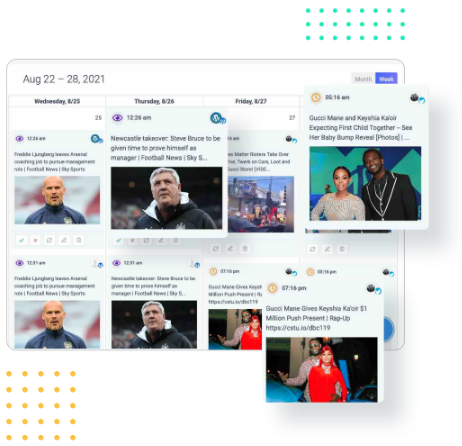
Social Media Calendar for Digital Agencies
Organize all your social posts and visualize your client’s social media content plan with an interactive Content Calendar
14 days free trial - no credit card requiredTherefore, planning your Facebook content ahead of time is the way to go. It doesn’t matter if you want to upload videos, reels, stories, or images – plan your weeks-long content ahead of time.
3. Notice the best time to post
It’s essential to figure out the best time to post on Facebook. It doesn’t matter if you’re uploading what type of content. What matters is that when people are responding to your content quite often.
The best way to find that out is to test out for several weeks, for instance, post stories throughout the day and see when they’re usually seen more frequently. Similarly, experiment with reels and posts to see when people respond to your Facebook content better.
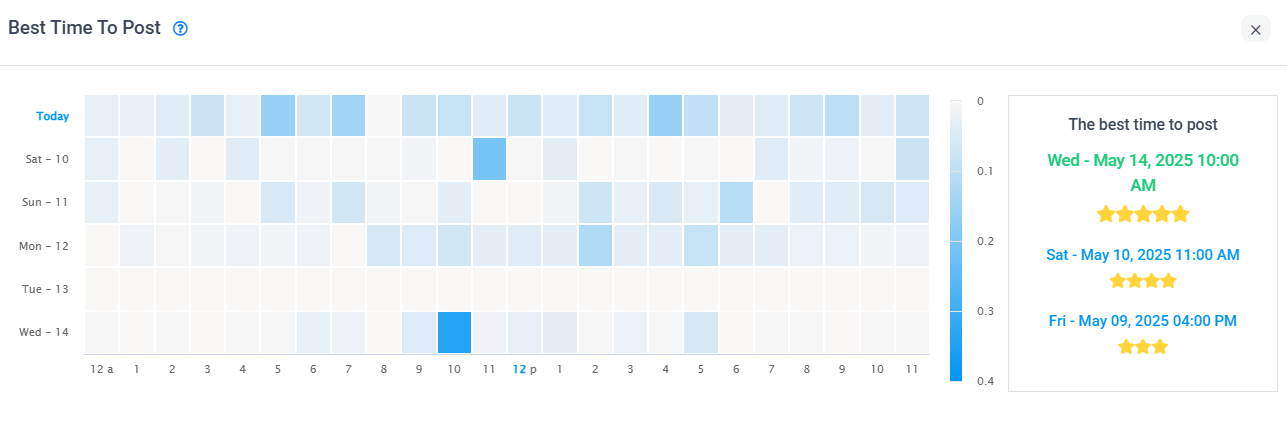
4. Design aesthetically pleasing imagery
Besides using a social media scheduling tool across all social media, it’s important to understand the psychology of graphics designing. Attractive images, beautiful illustrations, and high-quality photos entice the audience to react to the content.
Go through the article about the best online tools for designing social media images. Alternatively, use tools like Canva or Crello to create eye-catching images and videos for your Facebook posts, reels, and stories.
5. Ask questions or suggestions in the stories
One of the best tips for creating Facebook stories or reels is to include questions once in a while. The audience feels honored if you ask for their opinions or recommendations, especially the die-hard fans.
When you ask your followers a question or a recommendation, they respond to you via comments. As a result, the social media platform records the engagement on your social media content. It helps social media platforms understand your content better.
Moreover, the social media platform recommends your content to a lookalike audience, which helps you grow your social media followers organically.
6. Use call-to-action in your stories and reels
A simple yet effective hack for all types of Facebook content is to add a call-to-action at the end of the content – it works for carousel posts, stories, and reels.
However, it’s essential to have a call-to-action button in your stories and reels to point your audience in a specific direction.
Since you’d put time and effort into creating these short videos, it’ll be worth doing all the hard if you could increase your email subscribers or website visitors after all.
Facebook Marketing
Manage and grow your brand on Facebook. Create, schedule, and publish posts, videos, and Reels to Facebook pages and groups.
Get Started for FREE
Final words
I shared how to schedule Facebook posts in detail. Plus, I also touched on scheduling Facebook Reels.
This blog post aims to ensure that you’re capitalizing on the number one social media network.
I could simply explain the process of scheduling Facebook posts without any details, but it would not have impacted them. Now you know why you should schedule Facebook posts and Facebook Reels.
Going deep into the nuts and bolts of any topic goes a long way. I made sure that I assisted you all with relevant screenshots to make the navigation easier for everyone.
If you haven’t had a chance to try out the ContentStudio Facebook scheduler, then sign up for a free trial now and see how it transforms your social media scheduling.
FAQs
Why should I schedule my Facebook content instead of posting manually?
Scheduling saves time, improves consistency, and boosts engagement. When you schedule posts, Reels, and Stories in advance, you maintain a steady publishing flow, even when you’re busy. It also allows you to post during peak engagement hours without having to be online 24/7.
What is the best time to schedule Facebook content for maximum reach?
The best time varies based on your audience, but general high-performing times are:
- Posts: Weekdays between 9 AM – 12 PM
- Reels: Evenings between 6 PM – 9 PM
- Stories: Midday around 11 AM – 1 PM
Use analytics tools or a platform like ContentStudio to identify your audience’s most active hours.
Can I schedule the same content across Facebook and Instagram?
Yes, you can. Most scheduling tools, including Meta Business Suite and ContentStudio, allow you to schedule content for both Facebook and Instagram simultaneously. Just make sure your content is optimized for each platform (e.g., aspect ratios for Reels or Stories).
Does scheduling content affect engagement or reach negatively?
Not at all. In fact, scheduling improves engagement because it ensures you’re posting consistently at optimal times. The Facebook algorithm favors active, engaging profiles. As long as your content is valuable and consistent, scheduling supports your growth—not hurts it.
Recommended for you
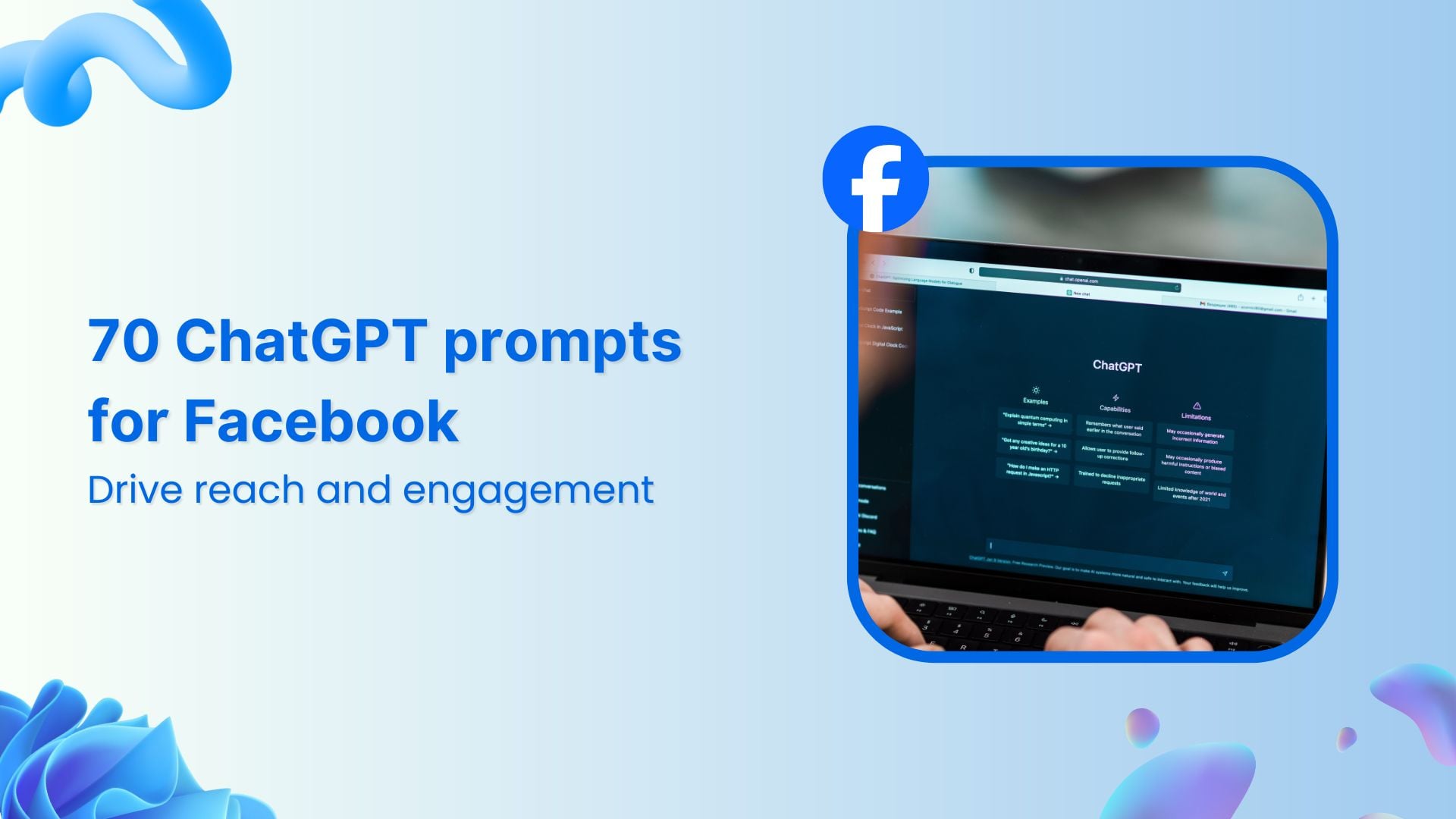
70 ChatGPT prompts for Facebook to drive reach and engagement


Powerful social media management software
14-day free trial - No credit card required.
